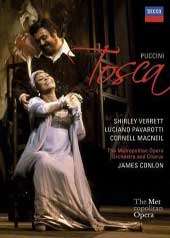|
Back
01/27/2011
Giacomo Puccini: Tosca
Shirley Verrett (Floria Tosca), Luciano Pavarotti (Mario Cavaradossi), Cornell MacNeil (Scarpia), John Cheek (Cesare Angelotti), Fernando Corena (Il sagrestano), Andreas Velis (Spoletta), Russell Christopher (Sciarrone), Philip Booth (Un carceriere), Robert Sapolsky (Un pastore), The Metropolitan Opera Orchestra and Chorus, David Stivender (Chorus Master), James Conlon (Conductor), Tito Gobbi (Production), Rudolf Heinrich (sets and costumes), Kirk Browning (Video Director)
Recorded live at the Metropolitan Opera (December 19, 1978) – 154mn
DECCA Ref. #: B0014793-09 – Picture format 4:3 – Colour mode: Colour – Region Code: 0 (worldwide) – CD1: LPCM Stereo – CD2 Bonus: DTS Digital 5.1 Surround
Subtitles in Italian, English, French, German, Spanish, Chinese – Libretto in English

At a time when one so easily raves over the Alagna, Calleja, Tyrfel, Mattila, DiDonato, et al. – yes, they are darn good, no question about it – the release of this 1978 Met Tosca in DVD should probably tone down a little our panegyric appraisal of today's singers.
Although 2011 is not the "worst of times" at the Met, 1978 was still "the best of times". Looking back, this stellar cast eloquently exemplifies what it took to sing at Lincoln Center during the glorious years. What more could one ask for? Pavarotti is in his stupendous prime. Verrett, who always so fully inhabited her roles, brings here commanding authority to the part of Floria Tosca. The voice is luminous, powerful, easy. She is one of those rare singers whose tessitura was so wide that she was able to sing roles written for mezzos and sopranos, eventually switching to the latter. Rightly so, one could argue that the low register of her soprano sometimes resorted to chest register. In the part of Tosca, it is noticeable in the parlando passages, but it adds depth and darkness to a superbly carved out character, yet leaving ample space to a firm, assured, and unequivocal passagio. You won't hear today such magnetic "E l'Attavanti!" or "Ma falle gli occhi neri" (Act 1), or "Muori, dannato. Muori! Muori! É morto, or gli perdono", and such contemptuous "E avanti a lui tremava tutta Roma" with a despising smirk on her face (Act 2).
MacNeil's Scarpia is just as stunning. In those days, whether you saw Tosca at La Scala, at Covent Garden, in Bécon-les-Bruyères, France, in Dowagiac, MI, or at the Met, all the Scarpias were look-alikes, the same one-dimensional character: tall, stout, broad-shouldered, throwing his chest out, garbed in the same black (vaguely) Victorian cut-away front frock-coat with inches of white lace sticking out from the sleeves, same above-the-knee black leather boots, with the same extravagant white wig, the same grimacing, sardonic smile. This is exactly the portrait of MacNeil's Scarpia. The difference, of course, lay in the quality of the voice, and the American baritone is perfect, as he always was in the Italian repertoire. What a formidable singer! Supporting roles (Fernando Corena, Andrea Velis, and John Cheek) are also meticulously cast and they remarkably blend in with the leads.
Twenty-eight year-old James Conlon delivers a creditable performance at the helm of an orchestra that, to this day, has remained at the highest level.
So, in view of all the above, it is of little importance if the filming is obsolete (in this respect, immense progress has been accomplished), if images are unstable, if silhouettes are followed by an echo, if lights accentuate physical imperfections, if overwhelming head shots ("Vissi d'arte" is entirely filmed from the shoulders up) do not leave anything to the imagination: wrinkles, teeth, purple tongues, shiny perspiration profusely running down the faces, make-up falling apart, not to mention the waistlines... But who cares, after all, before such powerful and admirable singing?
This DVD is a must have. For not-so-young audiences who will be blatantly reminded of what the Met once was, but also to younger ones, for whom this performance, vocally, should set the highest standards. And, maybe, with all due admiration, for the Alagna, Calleja, Terfel, Mattila, DiDonato, et al.
Christian Dalzon
|